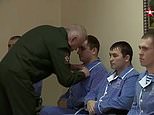Wounded Russian soldiers look distinctly awkward as they are handed courage medals
Doing their duty? Wounded Russian soldiers look distinctly awkward as they are handed courage medals by Putin’s deputy defence minister after fighting during the invasion of Ukraine
The wounded soldiers had not long returned from the frontlines in UkraineThey were medically discharged after sustaining a range of crippling injuriesFootage showed the terrified men receiving medals as they sat in wheelchairsThey could not conceal their expressions of fear and despair in front of Russia’s deputy defence minister It comes as Zelensky declared 16,000 Russians have been killed in Ukraine
<!–
<!–
<!–<!–
<!–
(function (src, d, tag){
var s = d.createElement(tag), prev = d.getElementsByTagName(tag)[0];
s.src = src;
prev.parentNode.insertBefore(s, prev);
}(“https://www.dailymail.co.uk/static/gunther/1.17.0/async_bundle- -.js”, document, “script”));
<!–
DM.loadCSS(“https://www.dailymail.co.uk/static/gunther/gunther-2159/video_bundle- -.css”);
<!–
Footage has emerged of several wounded Russian soldiers frozen with fear and regret as they wait in line to receive medals of honour from Russia’s deputy minister of defence.
The soldiers had not long returned from the frontlines in Ukraine, where they had sustained a variety of crippling injuries amid Putin‘s invasion.
Sat together in a row of wheelchairs, the medically discharged soldiers – some missing entire limbs – waited in silence as deputy defence minister Alexander Fomin waxed lyrical about their courage and sacrifice, before being presented with their rewards.
Each soldier shared a handshake with Fomin and declared: ‘I serve Russia!’ as the Colonel-General pinned a medal to their chest, but the prideful facade could not conceal the troops’ real feelings.
The video, broadcast by the Kremlin-controlled Channel One, showed clear expressions of terror and despair emblazoned across the young men’s faces.
It comes as Ukraine’s armed forces continue to inflict devastating losses on the invaders, with President Volodymyr Zelensky announcing yesterday his forces had killed more than 16,000 Russian troops.
NATO meanwhile estimates between 7,000 and 15,000 Russian soldiers have already died after just one month of war.
The soldiers had not long returned from the frontlines in Ukraine, where they had sustained a variety of crippling injuries amid Putin’s invasion
The video, broadcast by the Kremlin-controlled Channel One, showed clear expressions of terror and despair emblazoned across the young men’s faces
Sat together in a line of wheelchairs – some missing entire limbs – the medically discharged soldiers sat in silence as deputy defence minister Alexander Fomin (pictured) waxed lyrical about their courage and sacrifice, before being presented with their rewards
Fomin reeled off a list of cliches as he stood in front of the ailing troops, many of whom were missing feet or legs as a result of the bitter conflict across the border.
‘You all carried out the orders assigned to you, you all gave one hundred percent,’ Fomin said.
‘Like real men, like real soldiers, you continued the glorious military traditions of our grandfathers and fathers,’ he proclaimed.
But his audience refused to acknowledge the speech and instead merely sat in silence and stared into space, perhaps reliving the horrors of a war which has resulted in the death of thousands of their countrymen.
A second clip showed a wounded and bedbound soldier, also missing a leg, looking up in bemusement at another of Russia’s defence ministers who told him: ‘I hope you’ll get back on your feet,’ as he handed out another medal yesterday.
Minister Yunus-Bek Evkurov was seen towering over the crippled foot soldier, who lay rigid in his hospital bed and only managed to utter one or two words in response to Evkurov’s questions, clearly unsettled and seemingly paralysed with fear.
A second clip showed a wounded and bedbound soldier, also missing a leg, looking up in bemusement at another of Russia’s defence ministers who told him: ‘I hope you’ll get back on your feet,’ as he handed out another medal yesterday
Minister Yunus-Bek Evkurov pinned a medal to the young soldier’s chest and shook his hand, but the man lay paralysed with fear
The soldier simply lay in bed and looked up at the deputy defence minister, only managing to utter one or two words in clipped tones in response to questioning
Ukrainian President Volodymyr Zelensky said late last night that Russian forces have been beaten back from the outskirts of Kyiv by the ‘powerful blows’ of Ukrainian forces as the war entered its fifth week.
Zelensky’s troops are now launching counter-attacks in an attempt to take the southern city of Kherson today, which was the first major urban centre to be seized by the invaders.
‘Over the past week, our heroic Armed Forces have dealt powerful blows to the enemy. Significant losses,’ Zelensky declared in a presidential address.
‘I am grateful to our defenders who showed the occupiers that the sea will not be calm for them even when there is no storm. Because there will be fire.’
Ukrainian service members inspect destroyed Russian military vehicles, as Russia’s attack on Ukraine continues, near the town of Trostianets, in the Sumy region on March 25
A destroyed Russian MLRS (multiple launch rocket system) vehicles with the ammunition still intact can be seen in Kyiv
Meanwhile, an adviser to the Ukrainian defence minister today declared Kherson should be won back within hours after his forces managed to successfully repel Russian advances outside the capital.
Markian Lubkivskyi told BBC Radio 4’s Today programme: ‘I believe that today the city will be fully under the control of Ukrainian armed forces.
‘We have finished in the last two days the operation in the Kyiv region so other armed forces are now focused on the southern part trying to get free Kherson and some other Ukrainian cities.’
Zelensky also welcomed a delivery of 1,500 German anti-aircraft missiles, but continued to urge western leaders to increase its supply of tanks, planes and missiles to help fend off Russian forces.
![]()


